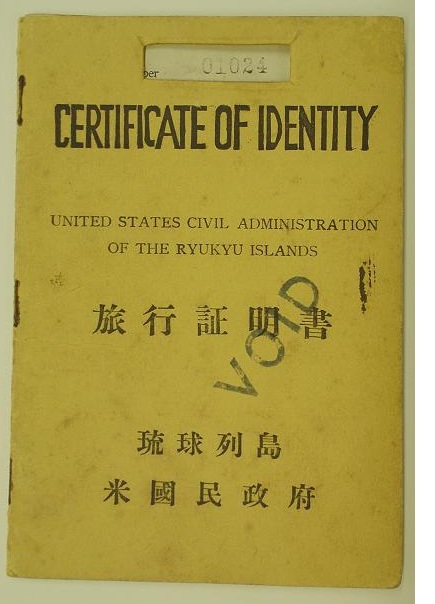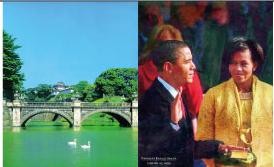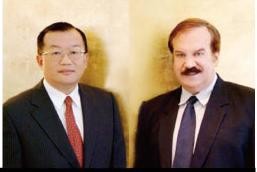|
Issuance of Certificates of Identity as Travel Documents
for the People of Taiwan
|
In his letter dated July 26, 1950 in response to the question concerning "Future of Formosa", Kenneth Younger, the then British Acting Foreign Secretary, mentioned that "Formosa is still de jure Japanese territory, and there is no Government of Formosa as such." The British viewpoint on the legal status of Formosa was reaffirmed by General Douglas MacArthur's statement at a U.S. congressional hearing held on May 5, 1951: "Legalistically Formosa is still a part of the Empire of Japan."
According to the Memorandum of Conversation prepared by Mr. Eric Stein of the Office of United Nations Political and Security Affairs on November 16, 1950 regarding the consideration of a framework for a plan for the solution of the Formosa question, one of the basic principles is:
"The United States, as a principal victor of the war in the Pacific and as the sole occupying power of Japan has great responsibility in the disposition of Formosa."
Today, what is Taiwan? Taiwan is the residual territory of imperial Japan now under ROC Chinese colonial administration as a proxy occupation force for the United States of America, the principal occupying Power specified in the 1952 Treaty of Peace with Japan.
American Perceptions of Taiwan
* On Oct. 25, 2004, U.S. Secretary of State Colin Powell confirmed that "Taiwan is not independent. It does not enjoy sovereignty as a nation, and that remains our policy, our firm policy."
* For many years, the "Taiwan" entry in the U.S. State Department publication "Treaties in Force" has clearly noted that "The United States does not recognize the Republic of China (ROC) as a state or a government."
* Such policies and pronouncements find a clear legal basis in a 1959 U.S. court decision, where the judges held that Taiwan, formerly called Formosa, "may be said to be a territory or an area occupied and administered by the Government of the Republic of China, but is not officially recognized as being a part of the Republic of China." See Cheng Fu Sheng v. Rogers, 177 F. Supp. 281, 284 (D.C. District, 1959).
Furthermore, in the appeal decision of Sheng v. Rogers (D.C. Circuit, 1960), the court described the status of Formosa as follows:
"Following World War II, Japan surrendered all claims of sovereignty over Formosa. But in the view of our State Department, no agreement has 'purported to transfer the sovereignty of Formosa to (the Republic of) China."
* On August 30, 2007, Dennis Wilder, Senior Director for Asian Affairs at the National Security Council, stated that "Taiwan, or the Republic of China, is not at this point a state in the international community. The position of the United States government is that the ROC -- Republic of China -- is an issue undecided, and it has been left undecided, as you know, for many, many years."
* Acting under his foreign affairs powers, the U.S. President recognized the "Republic of China" as the sole legitimate government of China as of December 31, 1978. However, no U.S. President has ever recognized the "Republic of China" as the legitimate government of Taiwan.
U.S. Court Decisions on Taiwanese Civil Rights Lawsuits
On October 24, 2006, Roger C.S. Lin assembled 228 supporters and filed a lawsuit against the United States of America in the U.S. District Court for the District of Columbia. In this lawsuit, the Plaintiffs alleged that the people of Taiwan are not correctly classified as having "Republic of China nationality." Moreover, based on the history of the Pacific War and the specifications of the Treaty of Peace with Japan, aka the San Francisco Peace Treaty (SFPT), they are entitled to carry some form of U.S.-issued travel documents.
Important excerpts from the court decisions are given as follows:
March 18, 2008 District Court Decision
Plaintiffs have essentially been persons without a state for almost 60 years. The last completely clear statement of authority over Taiwan came from General MacArthur in 1945. One can understand and sympathize with Plaintiffs' desire to regularize their position in the world. . . . . .
As sources cited by Plaintiffs make plain, at the end of World War II, the sovereignty of Taiwan was an undecided question. It remains a very delicate issue in international relations. . . . . .
According to the Plaintiffs, the decision not to cede Formosa to China was a considered judgment . . . . . the final draft of the SFPT did not transfer "full sovereignty" in Taiwan and the Pescadores Islands from Japan to China. . . . . Instead, Article 23 designated the United States as "the principal occupying Power," with the government of the ROC as its agent.
|
April 7, 2009 Court of Appeals Decision
America and China's tumultuous relationship over the past sixty years has trapped the inhabitants of Taiwan in political purgatory. During this time the people on Taiwan have lived without any uniformly recognized government. In practical terms, this means they have uncertain status in the world community which infects the population's day-to-day lives. This pervasive ambiguity has driven Appellants to try to concretely define their national identity and personal rights. . . . .
In 1949, China's civil war -- a battle between Chinese nationalists and communists -- ended; mainland China fell to the communists and became the People's Republic of China, forcing Chiang Kai-shek to flee to Taiwan and re-establish the Republic of China in exile. . . . .
The Taiwan Relations Act also outlined the United States' "expectation that the future of Taiwan will be determined by peaceful means" . . . . .
Addressing Appellants' claims would require identification of Taiwan's sovereign. The Executive Branch has deliberately remained silent on this issue and we cannot intrude on its decision.
Once the Executive determines Taiwan's sovereign, we can decide Appellants' resulting status and concomitant rights expeditiously . . . . without knowing Appellants' status, we cannot delineate Appellants' resultant rights.
|
The Unfinished Legal Business between the U.S. Military Authorities and the people of Taiwan.
* In December 1949, the Chinese Nationalist Government exiled to Taiwan, an integral part of the Empire of Japan as from April 1, 1945, and under Chinese military occupation since October 25, 1945. Hence the resultant Chinese colonial regime on Taiwan.
Within this context, on the one hand, under the laws and usages of war, the governing authorities on Taiwan are without any legal justification to issue passports to the people of Taiwan in the name of the "Republic of China."
On the other hand, with the coming into force of the Treaty of Peace with Japan on April 28, 1952, in which the United States of America is specified as the principal occupying Power, under the law of agency, the native Taiwanese persons are supposed to hold the Certificates of Identity (COIs) as the travel documents issued in the name of the United States military authorities instead of the passports issued in the name of the Republic of China. The United States military authorities are definitely in a position to exercise the right to issue these COIs.
The Ryukyu Islands Model
In light of the above, the undersigned officials of the Taiwan Civil Government hereby call upon the U.S. military authorities headed by the U.S. President as the Commander in Chief to adhere to the Law of Nations, the U.S. Constitution, the Treaty of Peace with Japan, the laws and usages of war, the law of agency, and relevant U.S. court decisions to issue the "Certificates of Identity (COIs)" as "Travel Documents" to the people of Taiwan; i.e., native Taiwanese persons.
Such "Travel Documents" should be similar to the COIs issued by United States Civil Administration of the Ryukyu Islands to the native inhabitants of the Ryukyus from the late 1940s to the early 1970s.

(SAMPLE)
The Certificate of Identity for the native inhabitants of the Ryukyu Islands under U.S. military occupation
TAIWAN CIVIL GOVERNMENT
| Chief Executive |
Kensho Sone |
| Deputy Chief Executive |
Gavin C.Y. Tsua |
| Speaker of the Legislature |
Wen-yen Chang |
| Representative in U.S.A. |
Nieco Tsai, Los Angeles
323-828-3377 |
| English Spokesperson |
Richard W. Hartzell
886-910-067-950 |
| Mandarin Spokesperson |
Roger C. S. Lin
886-952-603-979 |
January 21, 2013
(copyright retained by the authors)
email: usmgtcg.service@gmail.com
TEL: 886-3-355-6363
FAX: 886-3-355-8831
Online references:
http://www.usmgtcg.ning.com/
http://www.taiwandocuments.net/coi-menu.htm
God bless America, Taiwan, Japan,
and the whole World!
|
The false claims of "citizenship of the Republic of China" for
native Taiwanese Persons holding ROC passports should render
those passports illegal under US law.
|
|






